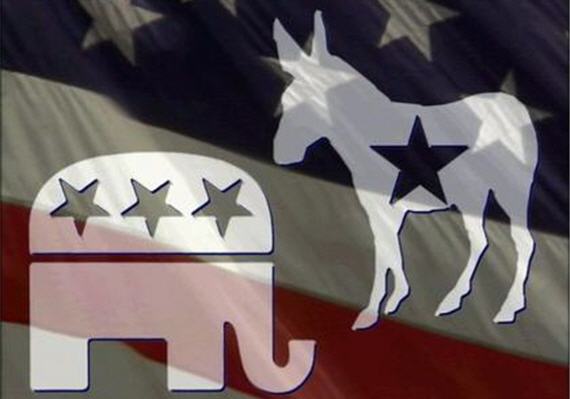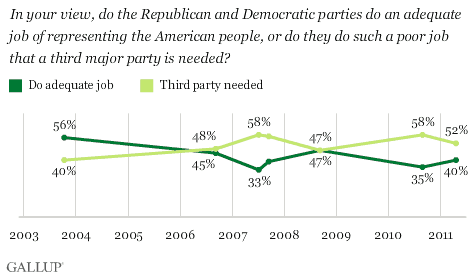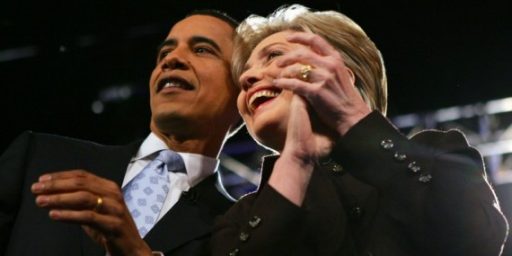Third Party in 2012?
It's a shame that Duverger's Law doesn't come with criminal penalties.
It’s a shame that Duverger’s Law doesn’t come with criminal penalties, as it would save us from nonsense like Pat Caddell and Doug Schoen‘s “Expect a Third-Party Candidate in 2012.”
What’s more, a poll of 1,000 Americans conducted by Douglas E. Schoen LLC in April found that a solid majority of Americans are now looking for alternatives to the two-party system. Overall, a majority (57%) of all respondents said there is a need for a third party.
More than half (51%) of voters favored having a third major political party. Nearly one-third (31%) said that having a third major party in our country is very important. Voters favored having a major third party run a candidate for president in 2012 58%-13%—with one in five saying they were absolutely certain or very likely to vote for a third-party candidate.
In line with these findings, 52% of all respondents in a May Gallup poll said there is a need for a third party, and for the first time in Gallup’s history, a majority of Republicans embraced the idea. In a June Rasmussen poll, 30% of respondents said they would consider voting for a third-party candidate for president in 2012.
That people are frustrated with the current choices is hardly new. Hell, they’re always frustrated with the current choices. Indeed, what Caddell and Schoen forget to mention is that the aforementioned Gallup poll is titled “Support for Third U.S. Party Dips, but Is Still Majority View.”
Indeed, support for a third party was six points higher about this time in the last election cycle. You know what didn’t happen? The election of a president from a third party. Odd, that.
We already see evidence on the ground that from the discontent coursing through the electorate there may emerge a third or even fourth political party that would be competitive in next year’s presidential election. Look no further than the recent launch of the centrist, bipartisan, Americans Elect. This is a nonprofit political organization that plans to break the stranglehold of the two-party duopoly by selecting a third presidential ticket, via an Internet convention, that will be on the ballot in 2012.
Uh huh. If Messrs Caddell and Schoen would like to wager, I’ll happily bet the house the president come noon on January 20, 2013 will have a D or an R in parenthesis after his name. And I’ll take out a second mortgage that “Americans Elect” will be of very little consequence.
Meanwhile the tea party movement is functioning as a quasi-third party already, having already demonstrated an unprecedented level of activism, enthusiasm and influence over the primary and general-election outcomes during the 2010 midterms—and, most recently, driving the debate over the debt ceiling. Polling done by Douglas E. Schoen LLC last year shows that a tea party presidential candidate could get between 15%-25% of the vote running on that line, depending on the precise alignment of the candidates.
Gentlemen, I know this is confusing but, even though they have “party” right there in the name, the Tea Party isn’t actually a political party. Thus far, its influence has been entirely confined to the Republican primaries and to Republican office holders. If they decide to form a splinter group in the event that, say, Mitt Romney is the Republican nominee, they’ll simply assure Barack Obama’s re-election.
There are now rumblings from Donald Trump, a former contender for the Republican nomination, that he may run as an independent. There are certain to be others.
Did you fellows happen to actually follow Trump’s bid for the Republican nomination? Not to spoil it for you, but he didn’t get it.
We have seen in the past where economic distress and political alienation can lead. In both the 1980 and 1992 presidential campaigns, third-party candidates emerged—John Anderson and then Ross Perot—and each garnered high levels of public support.
Uh huh. Between the two of them they amassed a grand total of zero–count ’em: zero–electoral votes.
The political order as we know it is deteriorating and disintegrating, and politics abhors a vacuum. So there is very good reason to believe that a credible third party, or even fourth political party, may be on the ballot in 2012.
No, there isn’t. Not if, by credible, you mean, having the slightest chance of capturing the 258 Electoral College votes necessary to claim the presidency.
Let’s say that Sarah Palin decides to form the Mama Grizzly Party and gets major backing. It’s plausible that there will be some states in which she gets more votes than Mitt Romney. (I can’t imagine a scenario in which she runs against Rick Perry.) But I can’t imagine what state she would win. Instead, she’d simply guarantee an Obama landslide, since he’d wind up carrying states that he otherwise wouldn’t have a chance in by virtue of a split Republican vote. After all, Obama got 43.8% of the vote in Texas last go-round to McCain’s 55.5%. If Palin siphoned off 12% of the Republican vote, she’d hand 38 Electoral votes to Obama.
Or, let’s say Michael Bloomberg decides to form the Pundits Dream Party and pour all his vast resources into the contest. He’d pull quite a few votes away from Obama in New York and elsewhere. Depending on whether the Republican nominee is more like Rick Perry or Mitt Romney, he’d either pull a lot or a few votes away from him, too. But it’s hard to imagine which state Bloomberg could carry, much less how he’d amass 270 Electors.
There have been times in our history when third party candidates did quite well. George Wallace actually carried five states in 1968; but that was the beginning for the end of the Southern Democrat and the start of a significant realignment. In 1912, Progressive Party candidate Theodore Roosevelt actually came in second, getting 88 electoral votes. But he’d been a two-term president as a Republican. And the Republicans would have likely kept the White House, too, rather than giving Woodrow Wilson a landslide had either he or Taft stepped aside.
Most famously, of course, there’s the election of 1860, after which a bit of unpleasantness followed. The Democrats split into two regional factions, a fourth party carried three states, and the fledgling Republican Party won the White House. No new party has done it since.








And what would the party platform for this party be? What are the principles, what are the policies, and how do you convince Rs and Ds to switch over?
What you said, basically. This is a pipe dream.
@Rob in CT: It’s a fantasy of pundits that most people think Just Like Them. So, yes, you will always find majorities who want a more “centrist” and “non-partisan” political culture. But that everyone’s center is different.
>Indeed, support for a third party was six points higher about this time in the last election cycle. You know what didn’t happen? The election of a president from a third party. Odd, that.
What also didn’t happen is that any third-party candidate earned more than 1% of the popular vote. In fact, all the third partiers in 2008 combined got no more than about 1%, with the discredited Nader getting the most. I could see a third party candidate doing better this time around–either someone like Bloomberg, or a Tea Partier if Romney is the nominee. Though I’m not betting on either, it strikes me as at least plausible. (I’m not even discounting the possibility that the Trumpster will do what he’s threatened a couple of times; it will test whether he really is as crazy as he’s been indicating.) I don’t think there’s going to be a significant third-party challenge to Obama from the left; while Nader might run, he’ll be mostly ignored just like last time.
Most third-party bids in modern times are just vanity runs.
I assume Pat Caddell is looking for work and can’t find it with either major party.
IMO (and it’s a political theory, too, IIRC), American third parties’ value lies not in winning elections, but in demonstrating that a particular set of ideas can capture the attention and/or votes of a sizable minority of the electorate.
And it’s not just Duvergerian forces at work here. The American primary process itself means that any even semi-serious candidate has a venue to compete that is more attractive than a real third party run.
Hmmm… funny assumption they are making here: That a really progressive liberal that is dissatisfied with Obama is going to vote the same way as a tea-partier who can’t stomach Romney. Something tells me that is not going to happen.
@OzarkHillbilly: Ding! Ding! Ding!
This is the ultimate reason why 3rd parties can’t get traction and upend one of the existing parties. For example, there’s a 98 percent chance that I won’t be satisfied with the Republican nominee this go-round (2 percent is a generous estimate of Huntsman’s chances) and 100 percent chance than I will again be unsatisfied with the Democratic alternative. This does not make me 99 percent likely to vote to Donald Trump, Michael Bloomberg, or Sarah Palin.
My guess is that, if Romney is the nominee, I’ll vote for him; if Perry is the nominee I’ll stay home; and if Bachmann is the nominee I’ll vote for Obama and/or explore job opportunities in Australia.
People love the prospects of third parties because they believe that the third party will represent their worldview perfectly. I mean, of course it would. Their worldview is so commonsensical that it’s a failure of democracy that neither party sufficiently embraces it.
The thing is, none of these pundits are willing to put their time and effort where there mouth is and engineer their own bid for president. Instead they write masturbatory articles about their political daddy fantasies and earn paychecks for this brain bilge-water.
Whisper “centrist” in my ear, baby, just one more time…
The major news media will not give any attention to a third party. That is obvious. They are controlled as much as the Democrats and Republicans are.
“Tweedle dee and tweedle dum”
@Trumwill:
Blame the current presidential primary system. We’d definitely get more variety simply with rotating states. Instead, we’re getting wide pendulum swings with (more!) Texas Republicans and Illinois Democrats, instead of California Republicans and Southern Democrats who could do well in the general.
Thus, someone who conceivably win the general election for Republicans easily, such as Romney, instead has had to pander to the base to the point of parody.
I’m not saying California Republicans and Southern Democrats would be good presidents automatically. But if the media wants to get more centrist candidates instead of just slobbering about them in weird fictionalized fantasies, they should point out to the actual problem of the primary system that prevents such centrists from winning in the first place. I’m looking at you, Iowa.
Lit3, I don’t know that the specific states at the front of the primary system are the problem. The most well-known are Iowa and New Hampshire, both purple-leaning states. But the people that vote in the primary tend not to be purple-types. I wouldn’t mind a rotating primary, though I don’t think it would change much.
I do actually score very moderate and centrist when I take tests for that sort of thing. But the problem with “us” by definition is that we aren’t radical enough to organize something like a third party.
So the game is for Democrats and Republicans to first convince their base that they are appropriately ideological, and then do a quick flip for the main election, to convince us that they are really (secretly, in their hearts) moderate and centrist.
Perhaps the WSJ should realize that the three major third parties, Libertarian, Green and Constitution run presidential candidates each cycle. Granted I’m a registered Independent but I support the LP when it comes to actual voting granted all we get is red and blue statist SOBs anyway. We hear this every presidential cycle “this will be the year for third parties, etc, etc, etc” but with the ballot access laws it makes it very difficult for a third party to compete with the two oligarchs in addition people fall for the lesser evil arguments.
It’s a good idea who’s time has come and gone. It’s too late for a third party. We need to move straight to a direct democracy. Time to stop kidding ourselves, the system is broken and adding another spook to the wheel won’t stop us from going in circles.
FIGHT THE CAUSE – NOT THE SYMPTOM
OsiXs (Revolution 2.0 – The Smart Revolution)
258 electoral votes needed to win? What happened to the other 12?
Gotta admit it’s hilarious that the 3rd party thing for pundits is about centrism and their personal definition of it, meanwhile the 3rd parties that actually exist consist of:
-Socialists who find Democrats not left enough.
-Bible-thumpers and Fortress America types who find Republicans not right-wing enough.
-The Libertarian Party, which shouldn’t need a description here.
For people that actually vote 3rd party, “centrism” is the enemy.
@b-psycho: Excellent point. The last significant third party that at least purported to be centrist was Perot’s Reform Party (before Buchanan took it over, that is). But in general, you are correct.
Jonathan Chait has made the often overlooked point that the media tends to define “centrism” as consisting of fiscal conservatism matched with social liberalism (a combo that fits their own ideological proclivities). In reality, there are far more voters who fit the exact opposite definition: conservative on social issues and liberal on economic ones. Yet for some strange reason the media seems unaware this type of voter even exists.
My thought on this matter is to remember Perot’s Reform Party, whose candidate captured about 19% IIRC of the popular vote. What is more important though is that in exit polls, over 40% of the voters polled stated that they would have voted for Perot, but didn’t “because 3rd party candidates can’t win elections.”
That exit poll quote sums up the potential of a “major” third party (which I will note the Liberterian, Green, and Constitution parites are NOT IMO) rising now or any other time in the forseeable future. It COULD happen, but by the same token, we could be invaded by the planet Zoltar.
You’re missing the point. Winning this one election isn’t the only reason to do something like this. Like Perot ALMOST did following his 1992 run (and the circumstances are FAR better for someone like him to run now than they were then), it could lead to the foundation for a national party to finally get poured. Imagine a few years from now when that party starts targeting swing districts and states and picking off congressional and senatorial seats. Get 5, 10% of the House or Senate in the hands of centrist to moderate third partiers, and you’ve totally changed the game.
@racehorse: “There’s not a dime’s worth of difference between the Republicans and Democrats.” George Wallace 1968 American Independent Party
@Cynic in NY: In what sense are Libertarian, Green and Constitution “major” parties? Combined, they’ve amassed zero electoral votes in their history.
@Richard M: I’m just saying they couldn’t get to 258–much less win! Not buying it? You’re expecting me to be able to add 435+100+3 and then divide by 2?
@b-psycho: The argument is that, as the parties become more programmatic and less catch-all, their appeal is diminishing. Shoot, I’m a life-long Republican and can see myself voting for only two of the people currently running. So a “sensible” party has theoretical appeal. But the logistics are a steep obstacle.
@Solomon Kleinsmith: Ross Perot did not “almost win” in 1992. He carried zero states and got zero electoral votes.
@Kylopod: Jonathan Chait has made the often overlooked point that the media tends to define “centrism” as consisting of fiscal conservatism matched with social liberalism (a combo that fits their own ideological proclivities). In reality, there are far more voters who fit the exact opposite definition: conservative on social issues and liberal on economic ones. Yet for some strange reason the media seems unaware this type of voter even exists.
Thats pretty much what is a modern day populist is now adays, a moralist busy body who wants to spend more tax payer money. I’ve seen that block represented by Rockafellar/Main Street Republicans and Blue Dog Democrats
1968: three way contest for president. Nixon won’t debate Humphrey and Wallace. Humphrey surges late but Nixon wins election by 1 %, Wallace carries 5 states. Did Wallace help Nixon win? Maybe so, since the south was not yet Republican and Wallace siphoned off some Democrat southern states.
If Humphrey had one more week, he would have won.
If LBJ had run, he would have won easily.
what about Ralph Nader. To my memory (no time to look things up) he tipped the election to GWB in 2000. When I think of a third party candidate this time around a decent moderate could tip the election to say Perry by taking some independent or centrist votes from Obama.
@Laurie: A moderate would also take votes from someone like Perry unless he can convince people he is a real centrist by election time (probably not), assuming Perry is the GOP nominee.
Satisfied party voters are satisfied in much the same way. Every disaffected voter is disaffected in his or her own way.
@James Joyner:
“Ross Perot did not “almost win” in 1992. He carried zero states and got zero electoral votes.”
I’m not sure why you said that to me… I didn’t say he almost won, or anything even remotely close to that. I said this is an opportunity to build a network of centrist and moderate state and local groups that could evolve into a real and lasting opposition.
@Solomon Kleinsmith: I misunderstood your transition, thinking the “Like Perot almost did” applied to what came before rather than that which would follow. I’m not sure that the Reform Party was ever really a party, though. Pat Buchanan seized it as a vehicle for something wildly different than what Perot advocated. There’s a reason the party and Perot shared initials; they were one and the same.
@James Joyner: Gotcha.
I’ve talked to a bunch of people who were active in the Reform Party back then (I was a teenager at the time) and what they told me is the party was, in fact, evolving into a entity independent of Perot (cheeky name coincidence aside). A moderate dem from Colorado named Richard Lamm was on his way to the nomination in 1996, when Perot changed his mind (again) and took the nomination. This pissed a ton of people off, weakened the party, and opened it up to being rushed by all those Buchananites four years later.
As you sort of imply there, a party can’t be about a person. It has to be about the organization, the leaders, the rank and file and some kind of overarching message. Perot started something that was evolving into that, but he sank his own creation with his giant ego.
@James Joyner: In re: Perot and the Reform Party, when Perot ran in 1992 he ran as an independent (no party label) and the organization that he formed at the time was called “United we Stand America.” He formed the Reform Party for his less successful 1996 run, but he did win enough votes for the party to receive party public financing for their 2000 presidential run, which Buchanan was able to capitalize upon.
From 1996-2000, the Reform Party was a real party. The elected a handful, if memory serves, of local office holders with their big fish being Gov Jesse Ventura of Minnesota (who quite the party during his term in office).
@Steven L. Taylor: That’s true. Just saying they were never important on the presidential level w/o Perot. And even with him, they got zero EVs.
@James Joyner: Indeed.
@Steven L. Taylor: & @James Joyner:
Exactly what I was getting at. The Reform Party could have been something that lasted, at the very least a minority party in the center that held some seats around the country.
It’s totally unrealistic to expect an organization to come out of nowhere and win the presidency in a single cycle, and just as stupid of a yardstick to judge a brand new organization by. If Americans Elect is able to build a network of centrist and moderate types around the country, and move the conversation, that’s not as good as getting into the White House obviously, but it’s a thousand miles better than the two party system we have now.
@Solomon Kleinsmith: The short term impact would be to elect a president from one of the two major parties but likely not the one most of those voting for the Center party would prefer. But, yes, it could theoretically either shift the debate, forcing on or both parties to the center, or ultimately cause the breakup and replacement of one of the two major parties.
@James Joyner:
It’s way to early to make any comment that isn’t me projecting what I’d like to see on it, but the most ideal situation with an Americans Elect ticket would be a true centrist to moderate former dem and republican that are able to garner just enough electoral votes to keep either from getting a majority. In the bylaws of Americans Elect, who I’ve interviewed, they state that under that eventuality, the delegates of Americans Elect would get to have a vote to see who they’d like to give our electoral votes to.
No idea if that will happen, but I can see it being possible in a handful of swing states. Depends a lot on who those two candidates are, how much more idiotic Obama and whoever the GOP candidate is acts between now and then and of course economic things.
I would not be so quick to dismiss Americans Elect. They have collected substantial financial resources, which is what it will take to get a presidential ticket on the ballot in all 50 states and the District of Columbia. It’s not a cliche to say there is unprecedented dissatisfaction with the Democrats and Republicans. In 1992, when disaffection with the two parties was not as high, Ross Perot was running first in the polls in May.
Even after his campaign self-destructed and he dropped out and then re-entered late in the campaign, Perot still garnered 19 percent of the vote. While Perot did not carry any states, he exceeded 20 percent in 28 states and 25 percent in eight states. If the AE ticket gets to 25 percent nationally, they would certainly claim a third of the vote in a number of states — and hold enough electoral votes to decide the winner. After the election, AE could negotiate with the other tickets, and the one that comes closer to AE’s platform would get its electoral votes.
No one should expect AE’s ticket to win. But by playing the decisive role in determining the winner, AE would have finally established a viable third party that breaks the Republican-Democrat stranglehold over U.S. elections.
@Lee Mortimer: Even with a number of wildly unlikely If’s, your scenario still doesn’t work. Getting 1/3 of the vote in a lot of states would still quite likely yield zero electoral votes. The party would have to gain a plurality–i.e., come in first place–in at least one state, the District of Columbia, or Maine congressional district to get any Electors.
@James Joyner: I’m not quite sure what you mean by “a number of wildly unlikely ‘Ifs’.” Most of what I said are simply statements of historical fact. The only thing speculative would be AE’s share of the nationwide popular vote. If the two parties are able to find some common ground over the next year, 25 percent for AE could be a substantial over-estimate. It could also be a considerable under-estimate, given the intense and growing public anger and disaffection with both major parties. But none of us can really predict until we get closer to November 2012. And keep in mind — it doesn’t take much more than a third of the vote to be a plurality and win electoral votes.
@Lee Mortimer: Well, to be fair, one wildly unlikely factor is the notion that a third group has the potential to match Perot-like numbers and even build off of them.
As is the notion that AE has any chance of “playing the decisive role in determining the winner” not to mention: “If the AE ticket gets to 25 percent nationally, they would certainly claim a third of the vote in a number of states ”
That is, in and of itself, a rather gargantuan “if”!
@Steven L. Taylor: @James Joyner: It really only boils down to one if… if they pick up high quality centrist to moderate candidates.
Perot was a terribly flawed candidate, and yet he was able to do that well. Obama is soft in the center, there is a good chance the GOP candidate will be a true wingnut… the opening here is FAR more amenable to a centrist ticket than during Perot’s time, and there is plenty of money to be had out there for a campaign.
As I said, IF you find a solid ticket with a centrist or left leaner together with a centrist or right leaner, with some charisma, a good story and no significant personal flaws… the time hasn’t been this right for such an opposition to rise in modern times.
@Solomon Kleinsmith: But your reasoning is wholly circular: you are saying that a third party candidate can attract a lot of vote if said candidate is really attractive.
If said candidate is really that attractive, then I am guessing that they have a shot at winning a primary race in one of the two major parties, depending on whether they are center-left or center-right leaning.
@Steven L. Taylor: No chance at all that a genuinely centrist or moderate candidate could make it through either party’s primary these days, but thats a pointless point anyway. Even if they theoretically could, why would they debase themselves by trying to get the nomination inside of an organization so corrupt and disconnected from what the American people want?
@Solomon Kleinsmith: The somewhat joking, but nonetheless correct answer is: because that is the only viable route to being elected president.
And the Democrats nominated a centrist in 2008 (center-left) and the GOP did the same in 2008 (center-right). There is not even political space in the dead center to do what you are claiming can be done.
@Steven L. Taylor: You really don’t understand what the word centrist means if you think Obama and McCain are centrists. That would make 80% of the country centrist… doesn’t make any sense. Look at their views and track records over their careers and you see a liberal and a conservative, although neither are extreme versions of such.
There is a ton of space between the two major parties. It’s right there in the polling data, whenever they actually give people a range of options on issues the majority of people stand between the boilerplate lib/dem and con/rep stances.
@Solomon Kleinsmith:
It would help your argument immensely if you had evidence for your position.
Perot is historically the best case example for what you are describing and yet, as James noted, the best he could manage was 2nd place in one state.
And I hate to tell you, but he was not especially ideologically different from Clinton or Bush. Indeed, in 1992 had he really wanted to be president, he should have run in the Democratic primary.
There’s not much I can add to Solomon’s insightful analysis of the Perot candidacy. Steven does make a point about the somewhat limited space in the center of the political spectrum for a “centrist” candidate to operate. The perception that Obama and McCain were both “moderates” was the principal reason that AE’s predecessor organization, Unity08, folded its tent without nominating a ticket in 2008. The dynamics are far different for 2012. Obama is acting like a wannabe centrist, but the Republicans won’t let him be one. There seems to be no such thing as too far right for the GOP in 2012. The opportunity for a centrist ticket in 2012 compared to 2008 is the utter disgust that the public feels about both halves of the U.S. government. If nothing else, the threat of a viable centrist ticket on the horizon could be the one thing that forces Republicans and Democrats to begin working in the national interest rather than in their own partisan interests.
@Steven L. Taylor: I’m curious as to how you see how Perot would have possibly fit into the democratic party… he was much more of a right leaner, especially in his realism (which has been borne out) on spending and entitlements, but even then was far too socially accepting to be a part of what the GOP was then, much less now. I was only a teenager then, but ran across the book Perot put out during that campaign season and reading it is like reading the manifesto of a socially moderate right leaning independent.
Both parties have moved farther from center since the time of Perot, and both have lost a large percentage of their former moderate members to the ranks of independents, although the GOP are farther down that road (I’d be willing to bet the dems would catch up within one four year cycle of having someone like Perry in office).
My argument has never been that I think said centrist-ish ticket is likely to win. Who knows what might happen in a year and a half, but I think it’s much more likely that it might lead to a situation where they’d get enough wins (with a strong ticket) that they’d keep either side from winning outright, and get some concessions from one of the major parties as far as cabinet positions, or something of the sort, much like the libs did with the torries in Britain.
@Lee Mortimer: “The perception that Obama and McCain were both “moderates” was the principal reason that AE’s predecessor organization, Unity08, folded its tent without nominating a ticket in 2008.”
This is actually a much repeated myth. They folded because the funding model they were using was blocked by a court ruling. They challenged this in court and won in 2010 if memory serves. They then changed their name to Unity ’12, then changed it again to Americans Elect.. and you have what you see now.
I’ve interviewed some of the top level staff at Americans Elect… they would have gone ahead had they had the money in 2008. They are not fans of Obama, nor the other side.
@Solomon Kleinsmith: You might be interested in the exit polling that showed Perot drew exactly evenly from Clinton and Bush in 1992. Thirty-eight percent of Perot voters would have voted for Clinton and 38 percent would have voted for Bush, if Perot had not been on the ballot. Six percent would have voted for other candidates, while 14 percent would not have voted. I have a PDF copy of the New York Times article with the exit poll results that I can email you if you’re interested. I found and registered my email address at your Rise of the Center site.
@Solomon Kleinsmith: Do you have any information on your website about your interviews with AE top-level staff?
@Lee Mortimer: Use the search box at the top to see some of what I’ve written about them already. I’ve been torn in a bunch of different directions the last couple weeks… I have a couple hours of interviews I need to parse into several posts that focus on certain issues.
@Lee Mortimer: Those numbers don’t surprise me. How a more stable centrist to moderate ticket might play will depend a lot on how Obama does in the next several months, and who the GOP candidate is.